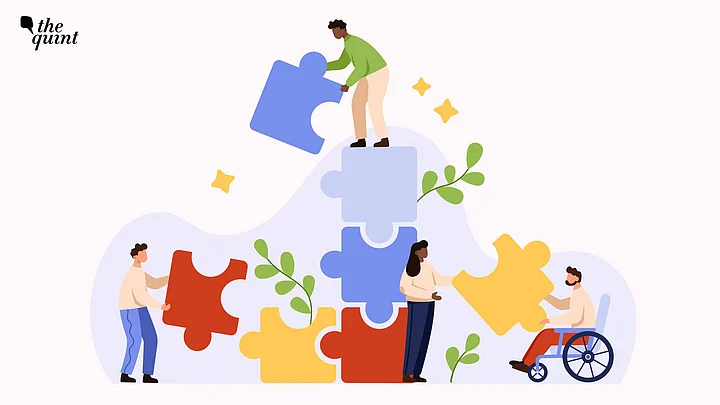An inclusive space goes beyond physical accessibility; it involves creating a culture that recognises and embraces diversity.
Inclusive education gives students with disabilities not just access to schooling, but also the opportunity to learn in a supportive environment, alongside their peers, without barriers.
Education is the foundation for inclusion, helping to build empathy, acceptance, and understanding. For students with disabilities, inclusive education isn’t just about learning in the classroom—it’s about integrating into the wider community.
However, the transition from school to employment often presents significant challenges. While educational opportunities for students with disabilities have improved, barriers in the job market remain. People with disabilities face limited employment prospects, prejudice, and a lack of support structures in workplaces.
How Can Workplaces Prepare for Employees With Disabilities?
In the workplace, inclusion means that people with disabilities are valued and respected, with the tools and support they need to succeed and thrive.
Diversity and Inclusion (D&I) departments play a pivotal role in bridging the gap between education and employment.
These departments advocate for inclusive hiring practices, ensuring that workplaces are accessible and that employees with disabilities are provided with the necessary resources.
Creating an inclusive organisational culture means going beyond fulfilling quotas—it requires integrating diversity into the company's core values and providing equal opportunities for career growth.
The relationship between education and employment for individuals with disabilities is deeply intertwined.
To ensure a successful transition from inclusive education to meaningful employment, collaboration between educational institutions, employers, and policymakers is crucial.
D&I departments can partner with schools to create tailored programs, such as mentorship and career development workshops, to prepare students with disabilities for the workforce.
Moreover, D&I departments can help employers understand the importance of accommodations and disability etiquette.
The Economic and Social Benefits of Disability Inclusion
From Amartya Sen's capability approach, inclusion enhances individuals' abilities to achieve their full potential.
By creating inclusive spaces in education and employment, persons with disabilities can contribute economically, reducing dependence and driving social progress.
Economically, inclusive workplaces benefit from increased innovation, creativity, and diverse perspectives. A study by Harvard Business Review revealed that companies with greater diversity experience a 19 percent increase in revenue.
Furthermore, businesses in the top quartile for racial, ethnic, and gender diversity are 25 percent more likely to outperform the national median profitability in their respective industries.
In India, the landscape of disability inclusion is gradually evolving.
According to WTW’s Wellbeing Programmes India Survey (2022-23), 71 percent of organisations offer inclusion and diversity training, while 62 percent provide inclusive benefits.
However, less than 25 percent of workplaces offer accessible toilets or necessary accommodations, and only 19 percent of companies have specific disability inclusion policies, highlighting the need for further progress.
Anti-discrimination laws, such as the Rights of Persons with Disabilities Act (2016), are crucial for promoting inclusion.
These laws mandate accommodations in the workplace and have increased job reservations for persons with disabilities. Yet, translating these legal provisions into everyday practice remains a challenge for many organisations.
Overcoming The Challenges for True Disability Inclusion
Despite the progress, several challenges hinder the full inclusion of persons with disabilities in the workplace.
One significant issue is the tokenistic approach some companies take, where the focus is on meeting quotas rather than creating meaningful opportunities for career advancement. Another challenge is the lack of trust between persons with disabilities and employers.
Many individuals and their families are skeptical of corporate claims of inclusivity due to past negative experiences in unsupportive systems. Changing these perceptions requires organizations to engage more deeply with the disability community, listen to their needs, and demonstrate genuine commitment to inclusion.
To achieve genuine inclusion, a multi-faceted approach is essential. Workplaces must ensure accessibility by providing accommodations such as assistive technology, flexible work arrangements, and physically accessible environments.
It is important to recognize that there is no one-size-fits-all solution for disability inclusion, so roles and opportunities should be tailored to the strengths and needs of each individual.
Companies should also take proactive steps to create opportunities for persons with disabilities by offering scholarships, mentorship programs, and training initiatives.
Additionally, collaborating with NGOs and community-based groups, can assist companies in developing inclusive policies, conducting accessibility audits, and creating awareness programs.
Disability inclusion is a continuous journey. While progress has been made in both education and employment, more efforts are required to create truly inclusive spaces. Inclusion is not just about fulfilling legal requirements or enhancing economic productivity—it is about recognizing the dignity and potential of every individual.
By fostering inclusive educational and employment practices, society can unlock the full potential of persons with disabilities and create a more just, equitable future. By investing in disability inclusion, we can ensure that everyone, regardless of their abilities, has the freedom to lead a meaningful life and contribute to society. This, in turn, will drive both social justice and economic growth.
(Aarushee Shukla is an independent researcher and data-driven advocate specializing in gender justice and social inclusion. Anoushka Augustine is a Consultant Coordinator at IIT Delhi’s Office of Accessible Education. This is an opinion piece and the views expressed are the author's own. The Quint neither endorses nor is responsible for her reported views.)

